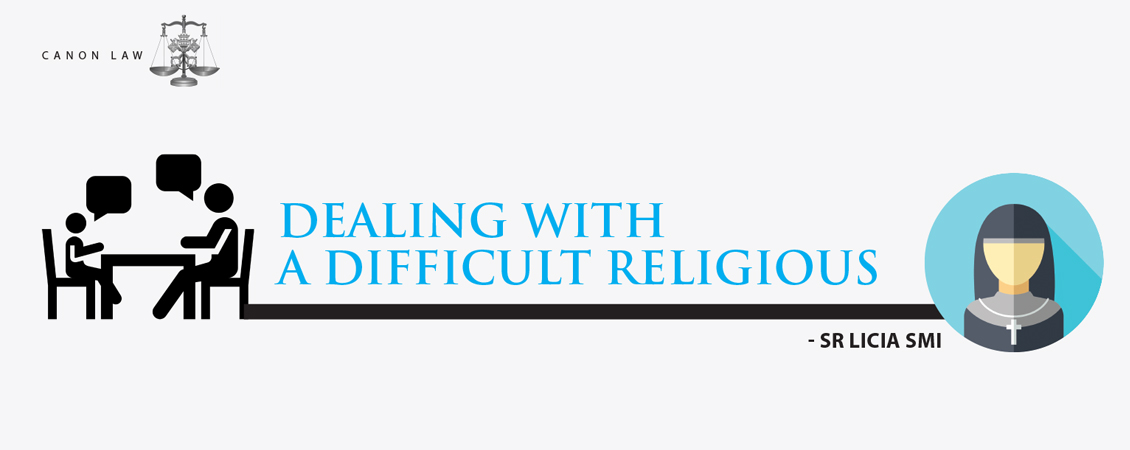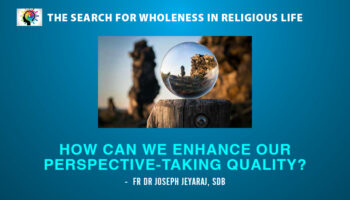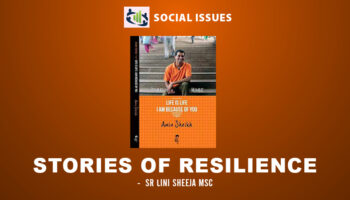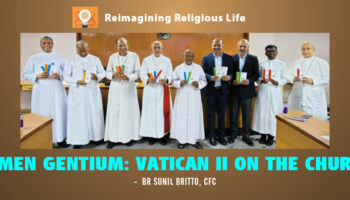Sr Veronica disturbs the peace and tranquillity of community life through her rude, unpleasant behaviour. Her words and actions damange the harmony of the community and make it difficult for others to live, work and support one another in the community. Harsh words, unruly behaviour and frequent fights seem to have become her characteristic traits. When corrected, she responds badly, and refuses to admit her faults. How can we deal with such a member?
Fraternal life in community is a constitutive element of religious life. The Code of Canon Law (CIC c. 602) speaks about communion as brothers/sisters living as ‘a true family in Christ’ through prayer, charity, mutual sharing and support. Another Canon (CIC c. 665§1) states that a religious has both the right and the obligation of community life in common. While defining the characteristics of the religious state, a third Canon (CCEO c. 410) explicitly refers to common life in community.
Since this sort of difficulty arises in the local community, it is the responsibility of the local superior to deal with this member initially. Patience and empathy should be the arms in dealing with that member. Such a religious must be led to see through concrete examples of habitual neglect of the obligations of consecrated life that prevents the harmonious living in the community and mission. Specific modification of behaviour patterns is to be recommended and counselling must be offered.
If kindness and counselling fail
If the disruptive behaviour continues, the next step should be to inform the major superior (provincial or general). This is a must for the good of the individual religious and to protect the rights of other members to live in the spirit of their institute. The difficult religious should never be neglected under the pretext of charity. It would not only be an action of injustice done to other members of that community, who are trying to live out their call, but also to the individual, who is in difficulty. Major superiors have the major responsibility to protect the rights of the members and also to convince everyone about their obligations to be fulfilled as members of the institute. The major superior is bound to do all that is possible to help that religious by way of exhortation and counselling. They may even resort to shifting that particular person from that community or ministry, because this type of problem can also arise from the incompatibility of that person with one or more members of that community, including the superior.
The major superior is to encourage the member experiencing difficulty to undergo a psychophysiological examination. At times, such behaviour could be due to chemical or hormonal imbalances or mid-life transition. There are instances, where prescribed medication has cured such abnormal behaviour of persons. If the behaviour is due to physical, emotional or psychological illness, treatment is required. Whatever be the actions resorted to, utmost care must be taken to protect the privacy and good reputation of the individual.
If treatment is needed
Two other Canons (CIC c. 665§1 and CCEO c. 478) state that major superior with the consent of the council can grant a member permission to stay outside the religious house as long as necessary for such a treatment. During this period of absence from the house they are to follow the obligations of religious life and are accountable to the superiors. The superior either personally or through a delegate is to keep in contact with the religious on leave and with the professional/physician who is treating the religious. After doing all that is possible by local and major superiors in helping out the member, if the disruptive behaviour persists or that the member does not co-operate with the superiors, exclaustration could be a solution (CIC cc 686; CCEO cc 548). If exclaustration also does not bring the good results and the incorrigibility continues in the individual, eventually dismissal procedure can be initiated according to the norms given in CIC cc. 695-704 and CCEO cc. 551-553 and also according to the prescriptions in their Constitutions. However, the process of dismissal is not to be applied to those suffering from emotional or mental illness or to those who are advanced in age.
Sr.Licia SMI
To subscribe to the magazine Contact Us





